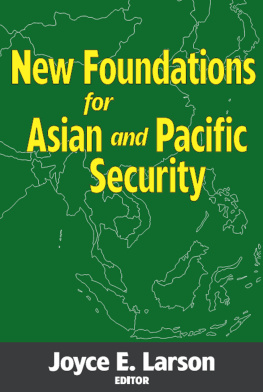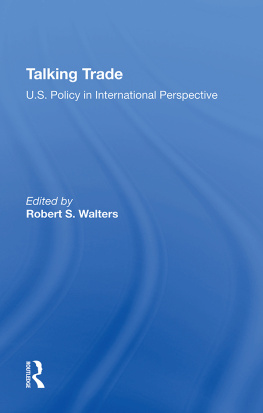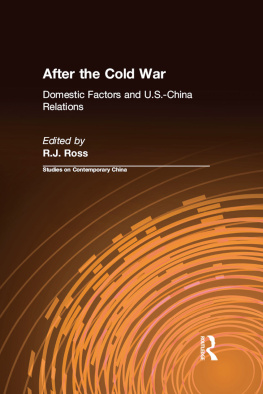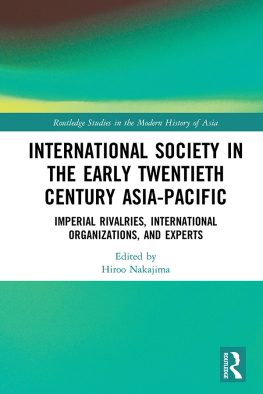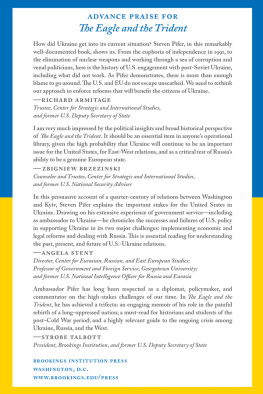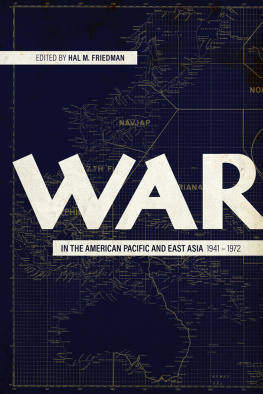ROUTLEDGE LIBRARY EDITIONS: BUSINESS AND ECONOMICS IN ASIA
Volume 34
UNITED STATES TRADE RELATIONS WITH THE NEWLY INDUSTRIALIZING COUNTRIES IN THE PACIFIC BASIN
First published in 1997 by Garland Publishing, Inc.
This edition first published in 2019
by Routledge
2 Park Square, Milton Park, Abingdon, Oxon OX14 4RN
and by Routledge
52 Vanderbilt Avenue, New York, NY 10017
Routledge is an imprint of the Taylor & Francis Group, an informa business
1997 Won Kwang Paik
All rights reserved. No part of this book may be reprinted or reproduced or utilised in any form or by any electronic, mechanical, or other means, now known or hereafter invented, including photocopying and recording, or in any information storage or retrieval system, without permission in writing from the publishers.
Trademark notice: Product or corporate names may be trademarks or registered trademarks, and are used only for identification and explanation without intent to infringe.
British Library Cataloguing in Publication Data
A catalogue record for this book is available from the British Library
ISBN: 978-1-138-48274-6 (Set)
ISBN: 978-0-429-42825-8 (Set) (ebk)
ISBN: 978-1-138-31273-9 (Volume 34) (hbk)
ISBN: 978-0-429-45806-4 (Volume 34) (ebk)
Publishers Note
The publisher has gone to great lengths to ensure the quality of this reprint but points out that some imperfections in the original copies may be apparent.
Disclaimer
The publisher has made every effort to trace copyright holders and would welcome correspondence from those they have been unable to trace.
Copyright 1997 Won Kwang Paik
All rights reserved
Library of Congress Cataloging-in-Publication Data
Paik, Won Kwang, 1960
United States trade relations with the newly industrializing countries of the Pacific basin / Won Kwang Paik.
p. cm. (Financial sector of the American economy)
Revision of the authors thesis (Ph. D.)Michigan State University, 1989.
Includes bibliographical references and index.
ISBN 0-8153-2597-5 (alk. paper)
1. United StatesForeign economic relationsPacific Area. 2. Pacific AreaForeign economic relationsUnited States.
I. Title. II. Series
HF1456.5.P3P35 1997
382.0973099dc21
96-48393
Printed on acid-free, 250-year-life paper
Manufactured in the United States of America
For my family
With the emergence of new Protectionism and the resurrection of international political economy as a legitimate field of international relations, international trade and trade relations have, once again, become the focal points of political science inquiries. Given its varied intellectual attractions, the central theme of international trade remains constant: What are the causes of trade relations? Specifically, what factors determine a flow of commodities from country A to country B? There are basically three major types of answers to this question.
The first type, the neo-classical explanation, is a traditional economic argument that the amounts and type of commodities that are traded are not determined by any one individual or any single enterprise. Rather, exchanges are determined by the advantages and disadvantages which are naturally endowed to a particular producer. If a particular person, business firm, or country has a naturally endowed advantage in producing a particular commodity, then that commodity will be exported to another place with a lesser amount of the endowed factor.
The second type, the neo-Marxist explanation, claims that exchanges of commodities are not naturally determined, instead they are structurally distorted. Because of the dialectical nature of the international capitalist system, trade relations are bounded by a nations status in a system as either an undeveloped or a developed economy. For an undeveloped nation, the nature and types of trade relations will be conditioned and defined by a developed trading partner. In short, trade decisions are made by developed nations and are determined by the conditions surrounding the international system.
The third type, the statist explanation, presupposed the self-interest of nation-states. Political interests, or more broadly speaking national interests, dictate the characteristics of trade relations between countries. What is to be gained or relinquished in trading or not trading with other countries.
Would trade serve national interests? Would it enhance national power through the elevation of national wealth? Based on such self interested calculations, a nation will pursue trade policies to fulfill its politicized interests. If an exchange of particular commodities is within the domain of perceived national interests, then trade will be allowed. If not, the exchange will simply be interrupted.
This study seeks to test empirically the three competing explanations of international trade with reference to a specific situation: an increased import penetration from the Pacific Basin Newly Industrializing Countries (NICs) into the United States in the 1970s and 80s. The main purpose of the present study is to: First, develop and test the models of international trade relations, specifically between the United States and the Pacific Basin NICs (Singapore, South Korea, Hong Kong, and Taiwan); Second, to evaluate the explanatory power of these models and re-evaluate the soundness of each theoretical perspective; and Third, to provide policy implications to the United States and the Pacific Basin NICs in their trade relations.
The analyses of the present study show that the neo-classical explanation, which focuses on comparative advantage as expressed in endowed production factors, has the highest explanatory power among the individual models. More importantly, the analyses also show that each of the Pacific Basin NICs is profoundly different from one another. Each NIC has a distinct set of determinants for its success in penetrating the U.S. markets. Although dependent, Hong Kong and Taiwan are somewhat more interdependent, Taiwan and South Korea share similar historical and political backgrounds, and Singapore and South Korea exhibit more active governmental interventions.
Mt. Pleasant, Michigan
Won K. Paik
AC | Autocorrelation |
ACF | Autocorrelation Function |
AR-1 | First Order Autoregressive Process |
AR-K | Kth Order Autoregressive Process |
ASEAN | Association of South-Eastern Asian Nations |
CA | Comparative Advantage |
CF | Domestic Capital Formation |
DEP | Dependency |
EGLS | Estimated Generalized Least Squares |
ER | United States Dollar Exchange Rate |
GE | Government Expenditure |
GNP | United States Gross Nation Product Growth Rate |
HK | Hong Kong |


